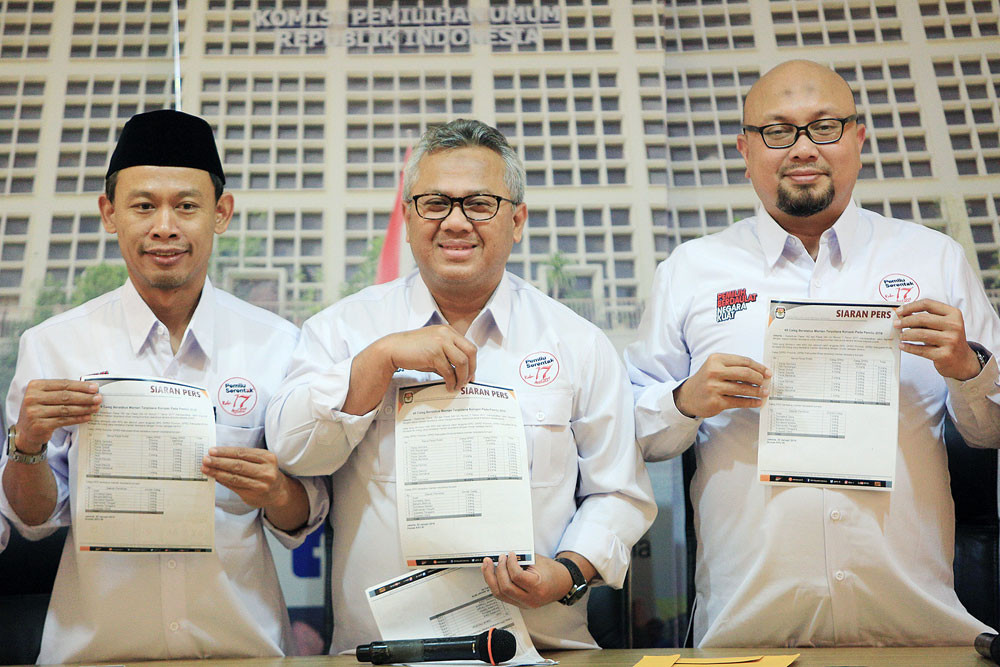Popular Reads
Top Results
Can't find what you're looking for?
View all search resultsPopular Reads
Top Results
Can't find what you're looking for?
View all search resultsVote against fraudsters
April 17 could serve as a test for whether the nation still tolerates, or at least remains silent about, acts of corruption.
Change text size
Gift Premium Articles
to Anyone
 Mind your choice!: General Elections Commission (KPU) chairman Arief Budiman (center), commissioners Pramono Ubaid (left) and Ilham Saputra show lists of legislative candidates who are former corruption convicts. The KPU has revealed 49 former convict-turned-legislative candidates. (The Jakarta Post/Dhoni Setiawan )
Mind your choice!: General Elections Commission (KPU) chairman Arief Budiman (center), commissioners Pramono Ubaid (left) and Ilham Saputra show lists of legislative candidates who are former corruption convicts. The KPU has revealed 49 former convict-turned-legislative candidates. (The Jakarta Post/Dhoni Setiawan )
A
mong the more than 9,000 candidates running for seats in the national and local legislatures in the April elections, 49 are former graft convicts, according to the General Elections Commission (KPU). The KPU disclosed their names on Wednesday as part of its responsibility to inform citizens as much as possible about the track records of those seeking public office.
The 49 names are from 13 of the 17 political parties competing in the elections. They are able to run thanks to a Supreme Court ruling last year that favored former graft convicts aspiring for legislative seats despite public outrage. Former graft convicts are only required to publicly announce their criminal records.
The parties with no former graft convicts running as regional legislative councillors, House of Representatives lawmakers or Regional Representatives Council members are the National Awakening Party, the National Democrat Party, the United Development Party and the new Indonesian Solidarity Party.
The KPU’s move to make public the names of legislative candidates with a record of corruption is perhaps a small step toward strict enforcement of the 2017 Elections Law, but a big leap for Indonesian democracy. Rather than public shaming, the announcement is part of much-needed political education — a responsibility that political parties have unfortunately failed to fulfil.
Article 240 of the Elections Law requires legislative candidates who have been convicted of graft to confess their checkered past to the public. The law encourages voters to exercise common sense in choosing the best men and women to represent them in the legislative councils.
Voting for legislative candidates because of sectarian reasons like religion and ethnicity is outdated. Track records, including conviction in graft cases, should be voters’ primary consideration when they are about to punch the ballot papers .
Such a public announcement of a criminal record played a part in the defeat of a candidate in the election for the Semarang mayoral post in 2015. At the time, many voters might have believed the candidate had repented, but the majority refused to risk giving their mandate to a person who had served a jail sentence for defrauding taxpayers of their money for personal or other people’s gain.
Corruption remains a major war the country has not won yet. Despite many in the executive, legislative and judiciary branches of power who have been brought to justice for graft, Indonesia is still perceived as one of the most corrupt nations. The country scored 38 of a possible 100 in the latest Corruption Perception Index released by the credible Berlin-based Transparency International.
Indonesia can prove the negative perceptions wrong if the nation gives its vote of no confidence to not only former graft convicts, but also other candidates who have been named corruption suspects or are under investigation for graft in the election. April 17 could serve as a test for whether the nation still tolerates, or at least remains silent about, acts of corruption.









